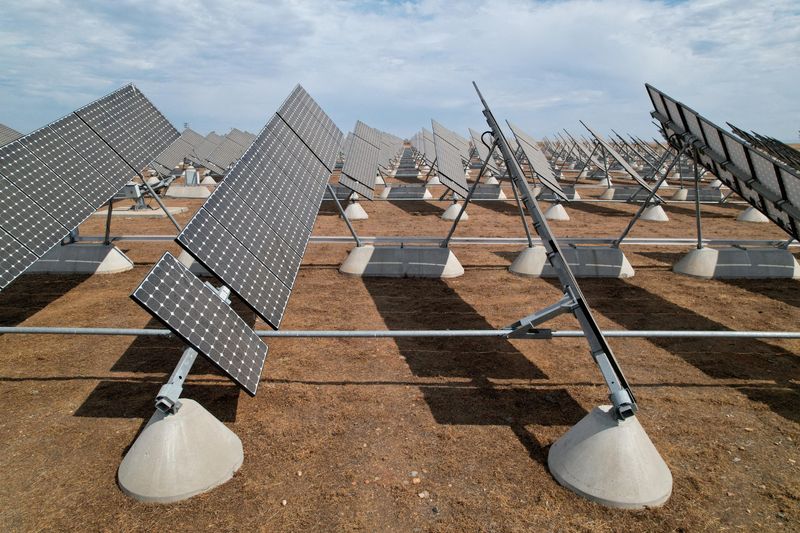By Ross Kerber, Tommy Wilkes and Isla Binnie
BOSTON/LONDON/NEW YORK (Reuters) - Sustainable funds faced a sharp slowdown in demand globally in 2023 amid political controversy and concerns about "greenwashing," even as many outperformed the broader market when the recovery of technology-related stocks bolstered their returns.
Environmental, social and governance (ESG) investing boomed in 2020 and 2021 during the COVID-19 pandemic as low oil prices spurred more investors to diversify beyond fossil fuels, and as fund managers sought to appear more climate-conscious. The category started to fall out of favor in 2022 as conventional energy prices soared.
Political backlash against ESG led by Republican politicians in the United States, as well as suspicions of greenwashing involving claims that are not substantiated, have also tarnished the luster of ESG funds. "Greenwashing" refers to companies making false or deceptive claims about the environmental benefits of their products, services or policies.
Globally, funds classified as "responsible investing" recorded $68 billion of net new deposits in 2023 through Nov. 30, LSEG Lipper data showed. That was down sharply from $158 billion for all of 2022 and from $558 billion for all of 2021.
The funds posted inflows despite U.S Republican politicians withdrawing billions of dollars of state money from top managers, including BlackRock (NYSE:BLK), and filing scores of bills aimed at curtailing the use of ESG criteria.
Most of those bills did not become law, amid concerns they could hurt returns for state pension systems and pushback from industry groups.
The funds' performance often beat the broader market, buoyed by their heavy exposure to technology stocks, including some of the "Magnificent 7" like Apple (NASDAQ:AAPL) and Alphabet (NASDAQ:GOOGL), which rallied in the last few months as the Federal Reserve signaled an end to interest-rate hiking.
The Dow Jones Sustainability World Index had a total return of 21.7% from the start of the year to Tuesday. It is a sustainability-focused subset of the S&P Global (NYSE:SPGI) Broad Market Index, which had a total return of 17%.
In 2022, that sustainability index also did better than the broader market, even as investors lost money. It had a total return of negative 15.6% while the broad index had a total return of negative 20%.
MORE FAVORABLE OUTLOOK
"Despite a difficult couple of years, there are signs that the market backdrop is becoming more favorable for sustainable strategies," said Iain Snedden, senior investment specialist at Aegon Asset Management, citing falling inflation, declining interest rates and "unjustifiably cheap valuations" for some growth stocks.
Total "responsible" fund assets were $2.56 trillion as of Nov. 30, up from $2.35 trillion at the end of 2022, according to LSEG Lipper. Excluding responsible funds, all other global fund assets were $52.6 trillion on Nov. 30, after recording net inflows of $1.1 trillion during the year.
Responsible funds this year still outpaced other funds in attracting net new deposits relative to their total asset growth, LSEG Lipper data showed.
Robert Jenkins, global head of investment and wealth for LSEG Lipper, said many ESG funds also benefited from being underweight energy and utility sectors which underperformed in the second half of the year as oil prices slid.
An example is the $16.5 billion Vanguard FTSE Social Index Fund. With a total return of 31.66% as of Dec. 19 it was beating 96% of peer funds for the year, compared with just 3% for all of 2022. Top holdings include Apple, Microsoft (NASDAQ:MSFT) and Amazon (NASDAQ:AMZN).
Vanguard declined to comment.
Inflows were modest this year in Europe, which accounts for about 80% of sustainable assets globally.
U.S. sustainable funds suffered outflows of $10 billion through November, tied largely to a decision by BlackRock to remove an ESG fund from a target portfolio of funds followed by financial advisers, according to Morningstar.
Pure-play sustainable funds have had a tougher year, with cleaner energy companies squeezed by rising rates and inflation.
The Invesco Solar Energy ETF (NYSE:XLE), for example, is down 27% in 2023.
Sam Whitehead, Invesco's EMEA ETF head of ESG product management, acknowledged clean energy had taken "a beating" in 2023. But fundamental demand for solar, its cost competitiveness and helpful government policies, bolstered the outlook, and the fund was not changing its approach, he told Reuters.
RIDING OUT THE BACKLASH
King & Spalding attorney Cal Smith, who advises large company boards, said he expected the Republican attacks to continue but said many big companies that have already invested in workforce diversity or tackling climate change will not be changing their practices.
He added, however, that companies will become less vocal about ESG issues. "They're concerned about getting dragged into the politics of this," Smith said.
Top asset managers BlackRock and Vanguard dialed back their support for ESG-related shareholder resolutions, contributing to an overall support rate for the resolutions of 22% of votes cast in 2023, from 29% in 2022, according to the Sustainable Investments Institute. They also added direct voting options for fund investors.
